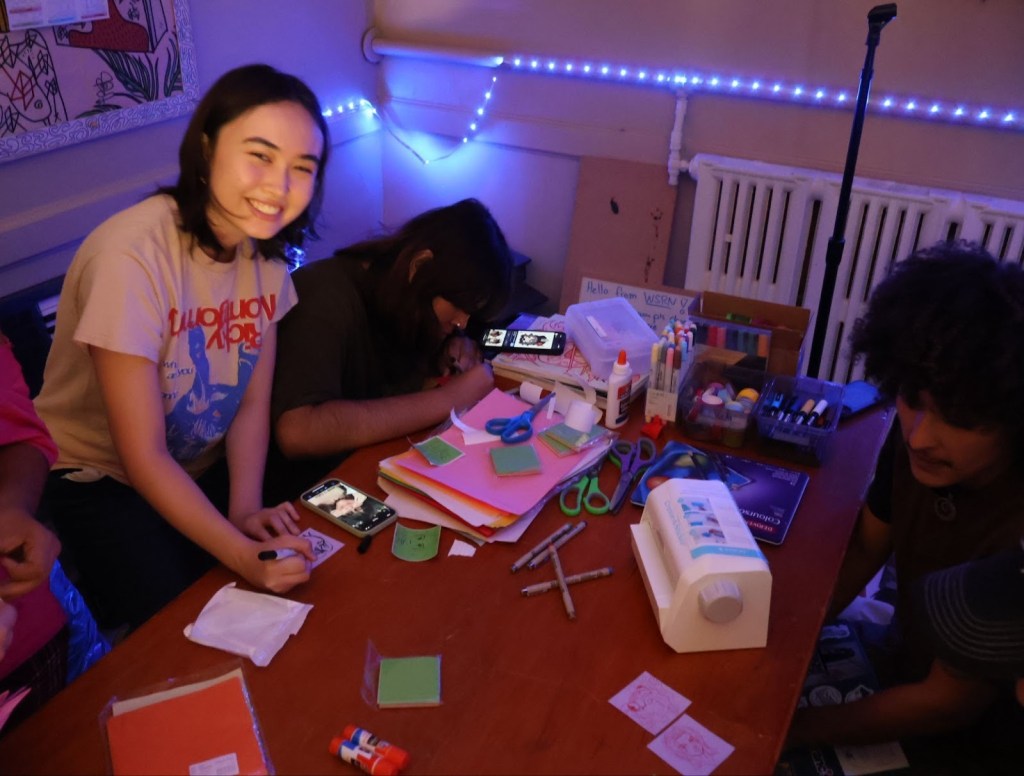The writers of Swarthmore’s online music publication, The Orpheus Review, aren’t just into music journalism and reviews. Expanding past their original charter, the recently reimagined Review held a music mixer in Parrish’s Big Room on Saturday, Oct. 5. The event brought together musical and non-musical groups: Kitao, WSRN, Analög, Small Craft Warnings, Voices, and artistic students from across Swarthmore’s campus.

Music certainly filled the space. In the Big Room, student bands — including G7 and Shopping Cart — played live songs. The WSRN room was open as well, funk blasting from the speakers. Meanwhile, other arts groups added their own touch to the space too: Analög laid out disposable cameras to capture the mixer; Kitao provided supplies and assistance for origami, sketching, and custom sticker making; and Small Craft Warnings created a spread of poetry selections for casual reading. Attendees met new people from creative groups, formed connections, and some experienced Swarthmore’s music and arts scene for the first time.
The mixer aligned with many of Orpheus’s long-term goals: to introduce new students to the Swarthmore arts space and to serve as an intermediary between pre-existing groups on campus.
Neria Spence ’28, Orpheus and WSRN member, said, “We wanted to focus on connecting people to other people on campus that care about music because it feels like a lot of the time, especially with WSRN — where you just have your show and then you leave, you don’t necessarily meet the other DJs — it can feel really lonely … especially when you are really passionate about something and it feels like there is no one else that shares that passion.”
Hope Dworkin ’26, another Orpheus and WSRN member, added, “[There are] first years that come in and are like, ‘I want to play music and I just don’t know where to rehearse’ … There’s all these resources, [but] the entry point is just not clear.”
In a post-COVID campus music scene revival, Orpheus looks to be an entry point.

Orpheus sticks to its namesake, the ancient legendary Greek hero with superhuman musical abilities. They write about music, along with other forms of media, and will hopefully relaunch a fixed web platform in the near future. However, this mixer, along with last month’s benefit show for Palestine, exemplifies the club’s broader role beyond writing and music as a campus community builder.
In other words, mixers are just the start. What’s next? Dworkin and Spence threw out some ideas: Death Grips Party? Zamrock? An expanded social media presence? Most importantly, an engagement of students from all over campus. Mixers, parties, and content that draw people in and keep them involved in the music and arts space at Swarthmore.
The Orpheus Review isn’t just into music, and it isn’t just a publication. In the future, the group looks to not only write about a variety of media, but play a central part in cultivating a thriving Swarthmore arts scene that centers on unifying campus, because, as Spence puts it: “It starts with community and it ends with community.”














Check out Orpheus Review’s new website here: https://sites.sccs.swarthmore.edu/orpheusreview/